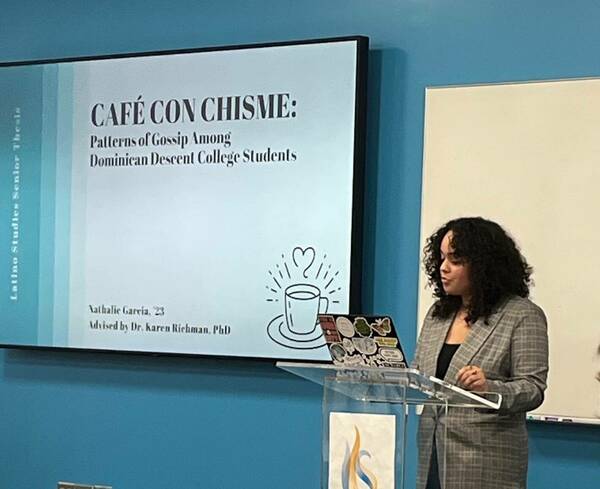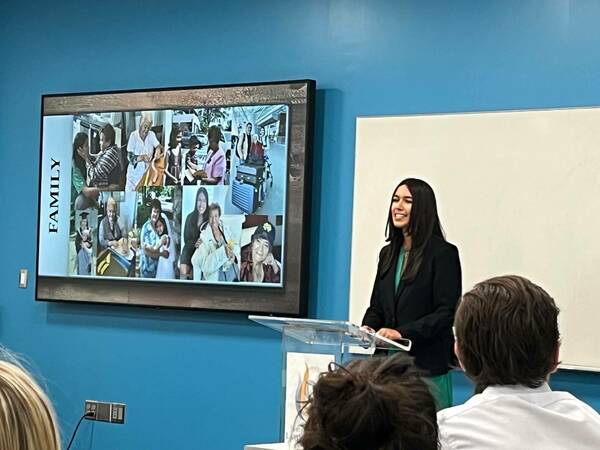
Two undergraduate students presented their senior theses in Latino Studies last week to a packed classroom on Bond Hall’s third floor.
Lindsey Reina and Nathalie Garcia entitled their joint lectures “Exploring Transnationalism, Network Formation, and Gender through Storytelling.”
“I’m so proud of these students. They came up with this presentation on their own,” Karen Richman, director of undergraduate studies for ILS, told the audience in her introductory remarks. “They are speaking to issues of importance to them.”
In addition to Garcia and Reina, four other students used their Latino Studies majors to completed senior theses in their other disciplines. The thesis is an optional component of the Latino Studies supplementary major. Overall, thirteen of this year’s graduating Notre Dame seniors earned a major in Latino Studies, while another thirteen came away with the minor.
Themes covered at the May 2nd presentation included collectivism, cooperation and solidarity on a transnational level, as well as women’s agency within and against patriarchal structures in the home and in the workplace. The element of collectivity represented by the projects stands in contrast to the radical individualism of mainstream American society, Richman said.
Both of the presenters discussed their families and national backgrounds. Reina, a senior with majors in Political Science and Latino Studies, focused on her Colombian immigrant grandmother “Lita.”
For her part, Garcia honed in on the cultural phenomenon of chisme, or gossip, using her own upbringing as an example. The Neuroscience & Behavior and Latino Studies double major conducted a survey of 10 college students of Dominican descent in the United States and discussed her findings as they related to cultural beliefs around chisme.

After they were done presented, the audience of about fifty people asked questions. For both young women, it was a display of the ethnographic skills they had picked up under the tutelage of Richman, a cultural anthropologist by training, as well as the public speaking skills they had acquired throughout their undergraduate careers.
The projects had to be approved by an Institutional Review Board to ensure they did not violate ethical standards. Garcia and Reina were essentially acting as “de-facto anthropologists,” Richman said.
Reina went first, sharing her presentation “Lita: a Colombian Woman’s Cultural Navigations in Pursuit of the American Dream.” “Lita”, short for Francilina Granados de Reina, grew up in the state of Cundinamarca, on a farm two and a half hours outside of Bogota.
Reina traced her grandmother’s migratory trajectory from New York City to Chicago to Atlanta, where Reina grew up in the same house as Lita, her de-facto babysitter. It was in New York City that her grandmother met her grandfather, Silvio, an immigrant from Cali, Colombia. They got married, moved to Andersonville, on Chicago’s North Side, and later settled down for good in Atlanta.
Reina showed pictures from her travels to the finca that her grandmother owns in Colombia's Andean interior. They grow plantains, corn, mangos, and coffee beans in the lush forest high in the mountains. As a child, Lita had to do a lot of manual labor to help keep the farm productive, and the work ethic stuck with her entire life, Reina said.
But she also resented the gendered roles of cleaning, gardening and cooking that were reserved for her and her four sisters. Meanwhile, Lita's three male siblings were able to do what seemed to be more interesting fieldwork and activities related to the coffeemaking process. She also didn't want to marry locally and have kids like so many other women in the area.
“La finca made her, but it also made her ready to leave,” Reina told the audience.
Before she came to the US, Lita migrated internally, becoming at 19-years-old the first sibling to leave the finca for the capital Bogota, where she worked as a dressmaker. She followed a friend who decided she wanted to come all the way in New York City, arriving on a Saturday and getting to work on a Monday. She lived and worked with other Colombian she hadn't known personally, exemplifying the networks of solidarity that allow immigrants to thrive in the right circumstances.
For Garcia, it was her childhood visits to her grandmothers house in the city of Santiago, Dominican Republic, that inspired her investigation "Café con Chisme: Patterns of Gossip among Dominican Descent College Students." In the open space of her grandmother’s gallery, people would sit to have coffee while sharing the latest chisme, illustrating the power of storytelling as well as the ambivalence interlocutors felt towards all “the drama.”
In part, she felt drawn to this topic because of the pressure “to prove you are connected enough to your culture” as a second-generation American. Garcia herself grew up in Lawrence, Massachusetts, in a community that is heavily Dominican.
Whereas in English, to gossip has a more negative connotation, to chismosear is to speak “artfully, within the performance frame of an authorized genre.” It's a practice that functions as a means of cultural transmission, dating back to the colonial period.
Garcia found that people can engage in this practice either passively or actively, and participants were cognizant of privacy issues as well as the alliances they made with others. Historically, it’s a feminized medium, with men and boys distancing themselves, but both sexes actively practice chisme. To engage in chisme helps participants "establish networks of reciprocity" as well as a "sense of belonging."
For more information about the major or minor in Latino Studies, please contact Karen Richman.
Originally published by at latinostudies.nd.edu on May 12, 2023.